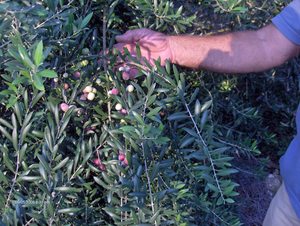 by Cary Cloud
by Cary Cloud 1. Well suited to Many Regions
Olives prefer a well-drained soil, lots of sun and a long growing season. Mature trees can tolerate temperatures in the mid-teens. Be mindful that trees in pots are more vulnerable than established, full-grown trees in the ground, and that wind chill makes a difference. Olive trees thrive, but are not likely to fruit, in areas where winter temperatures do not frequently fall below 55 degrees F.
2. Easy to Grow
Olive trees are extremely drought tolerant once established. They are not demanding about fertilization (though they will respond well to it) and are little bothered by pests and disease. They can live a thousand years or longer. Olives are tolerant of salty winds and grow well in coastal communities.
3. Great for Landscape or Patio
Olive leaves have a glossy top surface that sparkles in high sun and a flat, silvery-gray underside that is revealed in the slightest breeze. The visual effect is sublime. They make great trees for the landscape or may be grown in large pots. The leaves are evergreen. The trees reach 15' to 40' in height, depending upon variety.
4. Fruiting
Olive trees do produce fruit in Florida. Small varieties such as 'Arbequina' (15'-20') start production early, usually within 2 years of your purchase. Some varieties may take 6 years or longer. 'Arbequina' and many others do not require a pollinator; a lone tree will produce fruit. Some other varieties are not self-fertile and do require a pollinator of a different cultivar.
5. Fine Hardwood
Olive wood is dense and fine-grained. It is prized for carving and for trim-work on premium furniture and cabinetry. Cured olive wood is sold in variously sized blocks for over $300 per cubic foot.
6. History
Man has been cultivating the olive tree for over 8000 years. Olive branches figure heavily in many religions, as they did in the cultures of ancient Greece and Rome and throughout the Mediterranean. Olives are the world's most important oil-producing crop and have been since 6000 years B.C. So important is the olive that, in early Greek and Hebrew cultures, it was a capital crime to destroy an olive tree, even one owned by an enemy. See also Olive Trees, Yesterday and Today and Olive Trees in Florida: a Brief History.
http://www.olivetreegrowers.com/blog.php?view=detail&id=20
No comments:
Post a Comment